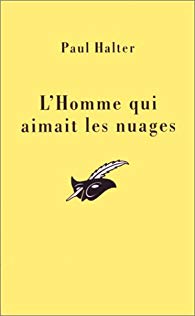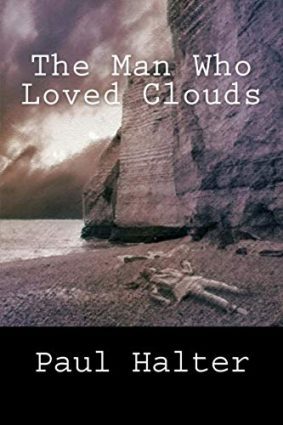First published: Le Masque, Librairie des Champs-Elysées, 1999. English translation: Locked Room International, 2018, trans. John Pugmire

 Like many of Halter’s later books, L’Homme qui aimait les nuages is part fairy-tale, part myth.
Like many of Halter’s later books, L’Homme qui aimait les nuages is part fairy-tale, part myth.
The story involves a miser who lives in a cursed house where the wind always blows (the house of Usher); a wood nymph who can predict the future, create gold from stones (the Midas touch), and make herself disappear in the Fairy Wood. (As the Puzzle Doctor says in his review, it’s clearly a nod to Carr’s “House in Goblin Wood”.)
It falls into a group with Halter’s other village mysteries, Les larmes de Sibyl (crimes predicted by a soothsayer) and Le cri de la sirène (victims falling off cliff, apparently killed by a banshee).
Halter excels in piling incident upon incident and sustaining an atmosphere, rather than in pure detection. There are several murders, and the enigmatic Stella, but little in-depth investigation.
Twist and Hurst make few deductions or question witnesses; they seem almost to react to the crimes, until the showdown. Several characters (Patience Walsh, the vicar, the Fishes) seem underdeveloped, or only tangentially connected to the plot.
Which is as much as to say that Halter emphasises imagination, the mysterious, the insoluble, over characterization or painstaking sleuthing. The story is all.
And his imagination is undeniable. While murders apparently committed by the wind lack the chutzpah of, say, La 7ème hypothèse or Les 12 crimes d’Hercule, there’s plenty of creativity.
The killer is surprising, and there’s much more going on under the surface than first appears. The “how” of the impossibilities, though, is far from Halter at his best.
 What, no references to Aeolus or Nephele?
What, no references to Aeolus or Nephele?
This is the first Halter novel I’ve read in English. I’m feeling lazy. (To assuage my conscience, I’m listening to Rameau.)
John Pugmire’s translation is notably terser than the original; it moves briskly, and it’s clean and idiomatic. He abridges some of the passages, or skips over adverbs and some descriptions.
Why, though, Dodoni (the modern Greek village) rather than the more traditional Dodona (the oracle and oak grove sacred to Zeus)?
My review is at https://www.goodreads.com/review/show/2518593419
Though I found the whodunit brilliant, I found the howdunit pretty average.
LikeLike
Yes; sometimes Halter’s situations are far more imaginative than his solutions. (7 merveilles du crime, for instance.)
LikeLike
This is now twice in a week, NIck, that you’ve been very complimentary about books I’m looking forward to reading. If I forward you my TBR, can you just keep doing this, please? It really helps knowing what’s going to be good 🙂
As the internet’s Unalloyed Halter Fanboy, I’m delighted to see you and Puzzle Doctor giving this one such a strong write up. I’d rush out and read it right now, but then it’d be an even longer wait until the next Halter translation…
LikeLike
I’d be happy to! Send me your list.
LikeLike